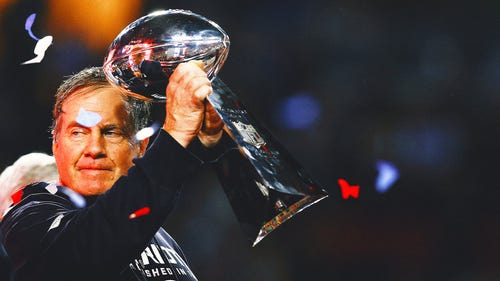
ON FOOTBALL: NFL better served with suspensions than fines?

Hitting millionaires with fines that barely make a dent in their wallets doesn't measure up to the dents those players are making in opponents.
Ejections and suspensions might be far more effective in the NFL.
Already this season, we've seen enough egregious hits and subsequent fines to raise this question: Just how much are tacklers becoming more cautious when it comes to potentially questionable hits? The answer just might be: not at all.
''It's all about teaching it at a young age and kind of drilling it into guys,'' says Redskins defensive back DeAngelo Hall, a 13-year veteran. ''A lot of older guys who are there trying to kind of change the game as we go - they've been in it for so long, it's hard to adjust.
''They can do whatever they want to do. I don't know what'll work. Taking a guy's money hurts. Making him not play hurts. And it still doesn't stop it. We had a guy here a couple of years ago, Brendon Meriweather, who ended up getting suspended for a couple hits and he still attacked receivers the same way.''
Meriweather was in a vast minority, a headhunting safety. With its player safety initiatives and ramped-up penalties for illegal hits, the league and the players' union have made headway.
Still, when Broncos safety Darian Stewart has been in two games this month and gotten fined more than $27,000 for hits on quarterbacks, it takes the conversation in the direction of ejections and suspensions.
In the past eight seasons, there have been 60 players expelled from games. Many of those have come for fighting. Others include contact with officials or ripping off an opponent's helmet.
But when Giants receiver Odell Beckham Jr. speared Panthers cornerback Josh Norman last December - Beckham's third major penalty of the game - there was no ejection.
At least Beckham was suspended for his next game, and he felt like a turncoat. Maybe that's the best way to deliver a stronger message.
''I think it's easy to get caught up in, `Oh, man, did you see three guys got hurt this week? Nothing's working,''' says Bengals tackle Eric Winston, president of the NFLPA. ''And then you go four more weeks and nothing happens and no one says anything.''
Winston advises to accumulate data from an entire season before making any conclusions. But he also recognizes the need to monitor closely and punish the bad hits.
''Obviously we're all trying to win, to make a living,'' he adds, ''but at the same time, we can't take those shots that are going to try to end someone's career and someone's season. While I don't always agree with the penalties, I do agree with the thought of, OK, we've got to change the way we're playing.''
Stewart reasons that backing off as a defender is a recipe for getting hurt, too. He insists that ''you're not out there trying to head-hunt anybody.''
''I look at it like this: You've got to go full speed because any hesitation, you're liable to get hurt. I'll be damned if I'll get run over by a quarterback. So I'm going to take my chance, but at the same time, just be smart.''
The smart route for the NFL appears obvious: heavier discipline for egregious incidents. Particularly for repeat offenders.
If that means ejections and suspensions, so be it.
Though the arguments brought by players against such sanctions are vociferous.
''You start ejecting people, you might as well turn the NFL into flag football,'' says Jets safety and special teams ace Rontez Miles. ''I mean, there's got to be some sort of contact. Ejecting people, that might be too much. Maybe after a second offense or something, or two or three times. But the first time? You've got to let us play.''
Winston also notes the size of NFL rosters works against going the college route, where ejections are more common.
''While a lot of people have said, `Oh, that's the way they've got to go,' they have a lot of different roster rules in college,'' he says. ''It's a different game in a lot of ways. You just don't have extra safeties to throw in like a 90-man roster.''
Winston believes with enlightened coaching, there can be a trickle-down effect that makes the game safer on all levels. Players such as Miami receiver Jarvis Landry and Falcons QB Matt Schaub say it is a declining problem.
Miles worries that ramped-up penalties will have unintended consequences.
''I don't think that would help because now you're taking us out of our natural habitats,'' Miles says. ''It's something that comes natural to us. We understand the rules and guys are trying (our) best to avoid those kinds of hits. At the same time, you've got 22 guys on the field, all grown men going full speed, sometimes hits like that are going to happen. That doesn't mean it's intentional.''
It also doesn't mean it is underserving of an ejection or suspension.
---
AP Pro Football Writers Arnie Stapleton, Teresa M. Walker and Howard Fendrich, and Sports Writers Joe Kay, Dennis Waszak Jr., Steven Wine and Charles Odum contributed.
---
AP NFL website: www.pro32.ap.org and www.twitter.com/AP-NFL










